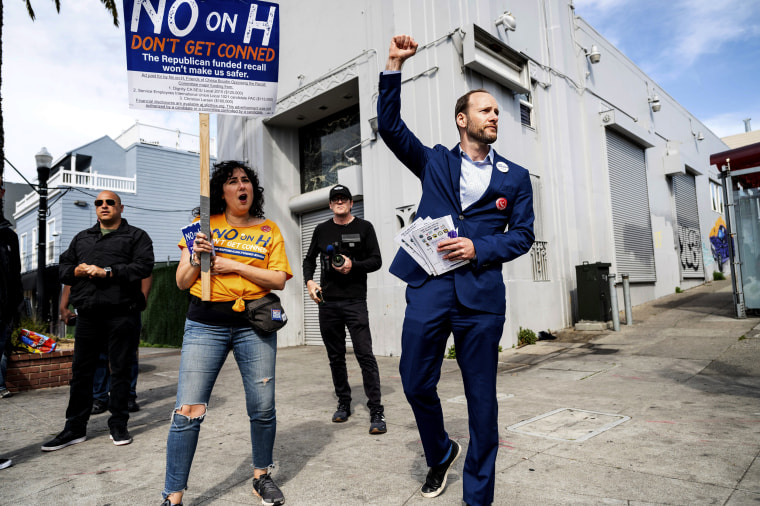Asian Americans, galvanized by rising crime rates and violent attacks against elders, appeared to be a driving force in Tuesday’s recall election that ousted San Francisco’s reformist District Attorney Chesa Boudin.
Community organizers say the result reflects the group’s simmering frustrations with progressive leaders for not taking seriously the trauma they’ve faced over the past two years. They themselves are split on the matter, with some campaigning for the recall while others opposed it, highlighting a widening divide in the group’s outlook on policing and crime.
Aarti Kohli, executive director of Advancing Justice—Asian Law Caucus, said that Asian Americans, though united in their concern about rising anti-Asian hate, hold a wide range of views regarding public safety.
“We need to acknowledge our communities’ fears while having a fact-based dialogue on what has and hasn’t worked,” she said. “Decades of policing and mass incarceration have not made us any safer.”
Right-wing media and Boudin’s critics slammed his reformist policies, like eliminating cash bail and reducing jail and prison populations, for causing a perceived rise in violent crime. (The data is not clear-cut: from 2019 to 2021, the homicide rate in San Francisco jumped 37 percent, but reported rates of violent crime in general have fallen.)
These policies do not poll particularly well among Asian Americans nationally. Recent data show an increasing support within the community for tough-on-crime tactics to address public safety. About half of Asian American adults say stronger hate crime laws would be the most effective policy in preventing violence, according to a Pew Research Center survey last year. Another 14 percent chose increasing local police presence as the top measure.
Boudin’s relationship with the city’s Asian American community has long been fraught. Last March, he came under fire for calling the murder of Vicha Ratanapakdee, an 84-year-old Thai immigrant, the result of a “temper tantrum” and declining to pursue hate crime charges.
Prominent liberal Asian American organizations campaigned for the recall. “We’re tired of having attacks on our seniors dismissed, delegitimized, ignored,” the Asian Pacific Democratic Club tweeted. “It’s not progressive or Democratic to talk at, instead of listen to, communities of color.”
According to a poll conducted last month by the local paper the San Francisco Standard, more than two-thirds of registered Asian American voters said they favored the recall — the highest level of support of all racial groups.
Boudin’s ouster is part of a string of high profile local elections that spoke to the burgeoning political power — and shifting allegiances — of the country’s fastest growing racial group.
In February, Asian parents in San Francisco, incensed by the scrapping of a merit-based admissions system at an elite high school, powered a successful recall campaign of three progressive school board members. In New York City’s mayoral race last November, Asian Americans, frustrated also by proposed reforms to specialized high school admissions and plans to build a jail in Manhattan’s Chinatown, came out in force for Republican candidate Curtis Sliwa.
Charles Jung, a trial lawyer and executive director of the California Asian Pacific American Bar Association, said the recent results should be a warning sign to Democrats to start listening to Asian Americans instead of continuing to take their support for granted.
“They want our votes but they place us last, if they consider us at all,” said Jung, who identifies as a life-long Democrat and spoke to NBC in his personal capacity. “That has to stop. You can’t expect to rely on our vote and not actually care.”
Jung, who helped organize three national rallies against anti-Asian violence, said many activists he worked with grew frustrated with Boudin’s superficial outreach to the community. He said that Boudin mishandled criminal cases, pressured victims to agree to diversion and falsely affiliated himself with grassroots initiatives, such as tweeting about a self-defense class that he had no ties to.
In late May, as the recall election approached, Boudin stepped up outreach to Asian American voters and launched a new victim services unit. But for skeptics like Jung who’ve long felt neglected by his policies, the move seemed too little too late.
“You can’t fail API victims, then make up for it with window dressing, photo-ops with Asian people, and tweets,” he said. “The community isn’t stupid; we can sense the fakeness.”
Some advocates, though, doubt tough-on-crime policies will leave a positive impact on vulnerable Asian American populations.
Manjusha Kulkarni, co-founder of the reporting forum Stop AAPI Hate, said less than 15 percent of thousands of self-reported hate incidents against Asian Americans actually constitute crimes. The vast majority are instances of verbal harassment or nonviolent forms of discrimination for which perpetrators cannot be arrested.
Because of this, Kulkarni said, increasing policing “won’t be at all effective in addressing anti-Asian hate.” Even for the small share of reported hate crimes, she said, the effectiveness of a criminal law approach is dubious.
“There’s no evidence, no studies, that show that hate crimes prosecution leads to any deterrence in the commission of hate crimes,” she said.
Kohli, of Asian Law Caucus, said Boudin implemented numerous initiatives, such as multilingual services to hate crime survivors, that enhanced “a sense of safety and healing” in Asian American enclaves. More humane than carceral approaches, she said, increased funding for such victim-centered and restorative justice programs will be more effective at combating anti-Asian violence and discrimination.
“We’ve seen across cities that have tough-on-crime policies that increased law enforcement and policing do not actually reduce crime,” Kohli said. “We need community-based resources like mental health services, and for our communities to be housed, educated, employed, and offered social support.”
CORRECTION (June 13, 2022 3:25 p.m. ET): A previous version of this article misstated the position of groups like the Chinese Progressive Association and Chinese for Affirmative Action on the recall campaign. The groups did not oppose it; they say they were neutral and did not take a stance. (The reference to the groups has been deleted.)
